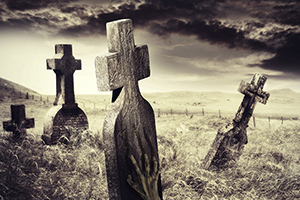Back to series
The Day of Judgment
Home at Last


Two Final Things, Then Home At Last
Click here to open a Print - Friendly PDF
Each of us is moving toward two great experiences. No matter how much money, power, or influence we may have, we cannot avoid them. Each day brings us another step closer to what no human being can escape: the hour of our death and the day of our judgment. As the writer to the Hebrews puts it: “it is appointed for man to die once, and after that comes judgment” (Heb. 9:27).1
Why write on such unsettling subjects? In the Bible God repeatedly reminds us of these sobering realities, exhorting us to recognize the brevity of life and our accountability to Him and calling us to make any needed changes while we still have time. By doing so, we will be enabled to grasp more fully the glorious and joyful future that lies beyond them.
As important as they are, these two subjects are unpopular today. Among affluent, secularized Westerners, it has become fashionable to ignore death and judgement.
Even to intimate one’s eventual death is considered crude, unenlightened, and morbid. And to speak of one’s accountability to God and the day of judgment is to risk social banishment. Even the church is largely silent on the two Final Things. When did you last hear a sermon on either topic?
In a short article, it would be impossible to do justice to what the Bible teaches about death or judgment; indeed, many books have been written about each. Nor does space permit a discussion of their relationship to other related topics, including the intermediate state, the rapture, and the millennium.2 So we will restrict our discussion to a few key biblical passages and how they can help us grow in grace and live with confident and expectant hope.
The Brevity of Life and Certainty of Death
In our fast-paced, high-pressured, stress-filled world, we easily lose perspective. Work, family responsibilities, social events, and various ministries and activities compete for our time and crowd out serious reflection on our mortality.
Yet throughout Scripture, God tells us repeatedly that our earthly life is short. Moses said, “The years of our life are seventy, // or even by reason of strength eighty; / yet their span is but toil and trouble; // they are soon gone, and we fly away” (Ps. 90:10).
Centuries later, David echoed him when he said, “As for man, his days are like grass; / he flourishes like a flower of the field; / for the wind passes over it and it is gone, // and its place knows it no more” (Ps. 103:15–16).
In the New Testament, James notes: “You do not know what tomorrow will bring. What is your life? For you are a mist that appears for a little time and then vanishes” (James 4:14). Many other passages speak to the same effect, reminding us that our life on earth is brief and uncertain and death is sure.
Once we are gone, we are soon forgotten. Life in all its busyness goes on without us, having taken little notice of our departure.
David’s reflection on the brevity of his own life and the prayer it evoked can help us. He prayed,
O Lord, make me know my end
and what is the measure of my days;
let me know how fleeting I am!
Behold, you have made my days a few handbreadths,
and my lifetime is as nothing before you
Surely all mankind stands as a mere breath! Selah.
Surely a man goes about as a shadow!
Surely for nothing they are in turmoil;
man heaps up wealth and does not know who will gather!
And now, O Lord, for what do I wait?
My hope is in you. (Ps. 39:4–8)
Unlike David, most of us do not ponder the brevity of our lives or think about death, especially our own. But doing so can be healthy for our spiritual life and has been a common practice of great spiritual leaders and godly people through the centuries. Benedict of Nursia told his monks, “Day by day remind yourself that you are going to die.
Hour by hour keep careful watch over all you do, aware that God’s gaze is upon you, wherever you may be.”3 Thomas à Kempis counseled,
Very quickly there will be an end of thee here; look for what will become of thee in another world . . . Oh, how wise and happy is he that now labors to be such a one in this life, as he wishes to be found at the hour of his death.4
Such recollections can help us stay grounded in reality, live a life that is pleasing to God, and give us great confidence as we contemplate the future.
You may want to consider the following simple exercise. Quietly ponder what you would like to be true of you at the time of your death. Your list might include a clear and firm grasp of God’s grace; assurance of salvation; intimacy with God, a morally upright life and works of love toward those in need; loving relationships with family and friends; and peaceful, reconciled relationships with others. Once you have identified your top priorities, begin making the changes that will characterize you at your life’s end, relying on the Holy Spirit to help you carry out your intentions.
This simple exercise, consistently pursued over time and in prayerful dependence on God, can have profound effects. When your time comes, you will be much better able to face death with confidence and peace.
The Day of Judgment
Beyond the death of our bodies lies the final judgment, the day when we must appear before the tribunal of Christ and give an account of our lives. The prospect of giving such an account evokes fear and anxiety in the human heart.
Who among us has lived such a pure and holy life that we would be comfortable with all the world knowing its every detail? Yet every person who has ever lived must one day stand personally and publicly to answer for what he or she has done or failed to do. No one can escape, no one can melt away into the crowd.
lived such a pure and holy life that we would be comfortable with all the world knowing its every detail? Yet every person who has ever lived must one day stand personally and publicly to answer for what he or she has done or failed to do. No one can escape, no one can melt away into the crowd.
Most believers are well aware that the Bible teaches there will be a day of judgment in which all nonbelievers will give an account of their lives to God.
Jesus made this clear when He said, “For the Son of Man is going to come with his angels in the glory of his Father, and then he will repay each person according to what he has done” (Matt. 16:27). What is perhaps less well known is that “each person” includes believers themselves.
They must give an account of their lives. The Bible affirms this in very clear terms. Writing to the believers in Rome, Paul said, “For we will all stand before the judgment seat of God; for it is written, ‘As I live, says the Lord, every knee shall bow to me, and every tongue shall confess to God.’
So then each of us will give an account of himself to God” (Rom. 14:10–12). To the believers in Corinth he said, “For we must all appear before the judgment seat of Christ, so that each one may receive what is due for what he has done in the body, whether good or evil” (2 Cor. 5:10).
Regularly pondering our accountability to God is a proven aid in maintaining a sober, godly perspective on life and holding on to God’s priorities.
What will the final judgment be like? As Matthew’s Gospel describes it, the final judgment follows Christ’s second coming and the resurrection of the dead. Jesus Himself gives a graphic picture. After describing in detail His second coming in Matthew 24, He described the Day of Judgment in Matthew 25:31–46:
When the Son of Man comes in his glory, and all the angels with him, then he will sit on his glorious throne. Before him will be gathered all the nations, and he will separate people one from another as a shepherd separates the sheep from the goats. And he will place the sheep on his right, but the goats on the left. Then the King will say to those on his right, “Come, you who are blessed by my Father, inherit the kingdom prepared for you from the foundation of the world. For I was hungry and you gave me food, I was thirsty and you gave me drink, I was a stranger and you welcomed me, I was naked and you clothed me, I was sick and you visited me, I was in prison and you came to me.” Then the righteous will answer him, saying, “Lord, when did we see you hungry and feed you, or thirsty and give you drink? And when did we see you a stranger and welcome you, or naked and clothe you? And when did we see you sick or in prison and visit you?” And the King will answer them, “Truly, I say to you, as you did it to one of the least of these my brothers, you did it to me.”

Then he will say to those on his left, “Depart from me, you cursed, into the eternal fire prepared for the devil and his angels. For I was hungry and you gave me no food, I was thirsty and you gave me no drink, I was a stranger and you did not welcome me, naked and you did not clothe me, sick and in prison and you did not visit me.”
Then they also will answer, saying, “Lord, when did we see you hungry or thirsty or a stranger or naked or sick or in prison, and did not minister to you?” Then he will answer them, saying, “Truly, I say to you, as you did not do it to one of the least of these, you did not do it to me.” And these will go away into eternal punishment, but the righteous into eternal life.
This awe-inspiring account of Jesus returning to earth in power and great glory, to judge the living and the dead, is intended to be sobering. God the Father “has given him authority to execute judgment, because he is the Son of Man” (John 5:27). In this passage He takes His position on a glorious throne and conducts the judgment of all who have ever lived, whose bodies have been raised and reunited with their souls.
After separating the nations into two groups, the sheep and the goats, Jesus focuses on a list of specific deeds and how each group performed or failed to perform them. The deeds are simple works of love such as giving food, drink, hospitality, clothing, and personal care to “one of the least of these brothers of mine” (His followers)5 in their time of need.
These works of love are things that anyone can do. The sheep, whom Jesus calls “the righteous,” are welcomed into “the kingdom prepared for you from the foundation of the world.” Their welcome is based on how each person has treated Jesus as that person has unknowingly encountered Him through His humble representatives on earth.
Not surprisingly, some people have read this as teaching that the sheep were saved by their works. But a closer look shows that this is not the case. The sheep are astonished by the Lord’s commendation and are completely unaware of having served Him in this way.
Clearly, they were not seeking to earn salvation by their works. More important, however, Jesus never taught salvation by works; rather, He taught that it was only God’s grace that could draw people to believe and trust in Him for salvation (John 6:36–40, 43–44).
He also taught that genuine faith in Him produced inner moral change and outward righteous conduct. That is precisely what we see in the sheep He commends. Their deeds are the fruit and the evidence of God’s grace and love in their lives. They are not the cause of but the fruit of their salvation.
 The failure of the goats (the wicked) to perform works of love toward Jesus is prima facie evidence of their lack of God’s saving grace. While much more sin characterized their lives, the omission of these key works of love for Jesus infallibly reveals the true state of their hearts.
The failure of the goats (the wicked) to perform works of love toward Jesus is prima facie evidence of their lack of God’s saving grace. While much more sin characterized their lives, the omission of these key works of love for Jesus infallibly reveals the true state of their hearts.
They have rejected Jesus and the revealed will of God and have walked in a way of their own choosing. Now God will ratify and confirm their decision.
Jesus says, “And these will go away into eternal punishment, but the righteous into eternal life” (Matt. 25:46). This is the fulfillment of Jesus’ earlier teaching, “Enter by the narrow gate.
For the gate is wide and the way is easy that leads to destruction, and those who enter by it are many. For the gate is narrow and the way is hard that leads to life, and those who find it are few” (Matt. 7:13–14). C.S. Lewis sums it up well,
There are only two kinds of people in the end: those who say to God, “Thy will be done,” and those to whom God says, in the end, “Thy will be done.” All that are in Hell, choose it. Without that self-choice there could be no Hell. No soul that seriously and constantly desires joy will ever miss it. Those who seek find. To those who knock it is opened.6
A significant but often neglected aspect of the final judgment is that there are degrees of punishment for the wicked and degrees of blessing for the saved. Regarding the wicked, Jesus makes this clear in His condemnation of three cities in which He performed amazing miracles for their lack of response to His message.
Then he began to denounce the cities where most of his mighty works had been done, because they did not repent. “Woe to you, Chorazin! Woe to you, Bethsaida! For if the mighty works done in you had been done in Tyre and Sidon, they would have repented long ago in sackcloth and ashes. But I tell you, it will be more bearable on the day of judgment for Tyre and Sidon than for you. And you, Capernaum, will you be exalted to heaven? You will be brought down to Hades. For if the mighty works done in you had been done in Sodom, it would have remained until this day. But I tell you that it will be more tolerable on the day of judgment for the land of Sodom than for you. (Matt. 11:20–24)
The punishment of these three cities would be greater than others because they sinned against the light they had been given, that is, the mighty works of Christ and His call to repent.
Paul expresses the same idea when he says of the unbelieving, “But because of your hard and impenitent heart you are storing up wrath for yourself on the day of wrath when God’s righteous judgment will be revealed” (Rom. 2:5). By their rejection of God’s truth, these people were accumulating more and more punishment for themselves.
They would be judged by the written word of God if they had it, or by the light of conscience and the word written on their hearts if they did not (Rom. 2:12–16).
Jesus also speaks of degrees of reward for faithful believers. In one instance, Peter said to Jesus,
“See, we have left everything and followed you. What then will we have?” Jesus said to them, “Truly, I say to you, in the new world, when the Son of Man will sit on his glorious throne, you who have followed me will also sit on twelve thrones, judging the twelve tribes of Israel. And everyone who has left houses or brothers or sisters or father or mother or children or lands, for my name’s sake, will receive a hundredfold and will inherit eternal life. But many who are first will be last, and the last first.” (Matt. 19:27–30)
In another place, He says to those who care for the poor and needy, “and you will be blessed, because they cannot repay you. For you will be repaid at the resurrection of the just” (Luke 14:14). Jesus promises that the sacrifices His followers make for Him and His kingdom in this world will be rewarded in the world to come.
He rewards our works, imperfect though they be, out of His abounding grace and love toward us, not because we deserve it. This is a cause for great rejoicing and encouragement in our earthly pilgrimage.
However, rewards can be missed through our neglect or forfeited through faulty work. Some people are too busy with other things to serve the Lord. Others are lazy and negligent. Still others are building their service on a faulty foundation. In each case, there will be little, if anything, for the Lord to reward.
This was a problem in Corinth. Paul warned the believers there of the very real risk of losing rewards if they built their ministry on a flawed foundation:
According to the grace of God given to me, like a skilled master builder I laid a foundation, and someone else is building upon it. Let each one take care how he builds upon it. For no one can lay a foundation other than that which is laid, which is Jesus Christ. Now if anyone builds on the foundation with gold, silver, precious stones, wood, hay, straw—each one’s work will become manifest, for the Day will disclose it, because it will be revealed by fire, and the fire will test what sort of work each one has done. If the work that anyone has built on the foundation survives, he will receive a reward. If anyone’s work is burned up, he will suffer loss, though he himself will be saved, but only as through fire. (1 Cor. 3:10–15)
We don’t know the specific details, but from what we do know of the Corinthian church, glib, shallow, flashy, self-serving ministry may have been the problem. This warning is just as applicable today as it was in the first century.
Some people in the church today are not serving Christ at all; others are poorly grounded and caught up in various religious fads, fleshly excitement, worldly thinking, or erroneous teaching. They may be saved, but their ministries are unworthy of reward.
Paul reinforced his warning to the Corinthians, saying, “For we must all appear before the judgment seat of Christ, so that each one may receive what is due for what he has done in the body, whether good or evil” (2 Cor. 5:10). The aspect of Christ’s final judgment, to which Paul here referred, is not their salvation, which he considered secure. Rather, it is the fruit of their salvation, their life and service to the Lord after being saved.
Paul Barnett says, “The teaching about the judgment seat before which all believers must come reminds us that we have been saved, not for a life of aimlessness or indifference, but to live as to the Lord (5:15).”7
God calls us to glorify Him by bearing much fruit in a life of love (John 15:8). Barnett continues, “The sure prospect of the judgment seat reminds the Corinthians—and all believers—that while they are righteous in Christ by faith alone, the faith that justifies is to be expressed by love and obedience (Gal. 5:6; Rom. 1:5), and by pleasing the Lord (2 Cor 5:9).”8
At the judgment seat, the Lord will examine the works of His people and confer or withhold rewards accordingly. Lest we wonder, His rewarding of our works does not conflict with His grace.
As Calvin observed: “There is no inconsistency in saying that he rewards good works provided we understand that that implies no denial of the fact that it is by free grace that we obtain eternal life.”9 To Paul the judgment seat of Christ was a serious matter that helped motivate him to live a life that was pleasing to God (2 Cor. 5:9). It can have the same effect on us. Periodically pondering the totally unwarranted grace and love God has poured upon us and our accountability to Him will propel us forward in grateful service to Him.
Home at Last
 The book of Revelation, the last book of the Bible, concludes with a picture that each of us should hold fast in our hearts and minds. It portrays the end of this present evil age of sin, suffering, and death and the final triumph of the kingdom of our God and His Christ. God’s work began in a garden and has now come to fulfillment in a city, the city of God.
The book of Revelation, the last book of the Bible, concludes with a picture that each of us should hold fast in our hearts and minds. It portrays the end of this present evil age of sin, suffering, and death and the final triumph of the kingdom of our God and His Christ. God’s work began in a garden and has now come to fulfillment in a city, the city of God.
As we enter that city in our resurrected bodies, we are coming home at last, welcomed by the Father, the Son, and the Holy Spirit, greeted by the holy angels and joyously united with all of God’s people. There we shall enjoy everlasting life in a world of love.
Amid the apocalyptic visions and symbolism of Revelation, we are given a vivid description of this glorious homecoming. Chapter 21 opens with judgment day now past, evil vanquished, and those whose names are written in the book of life entering into the joy of their Master:
Then I saw a new heaven and a new earth, for the first heaven and the first earth had passed away, and the sea was no more. And I saw the holy city, new Jerusalem, coming down out of heaven from God, prepared as a bride adorned for her husband. And I heard a loud voice from the throne saying, “Behold, the dwelling place of God is with man. He will dwell with them, and they will be his people, and God himself will be with them as their God. He will wipe away every tear from their eyes, and death shall be no more, neither shall there be mourning, nor crying, nor pain anymore, for the former things have passed away.” (vv. 1–4)
The former things have passed away, and the future things lie ahead. This is not the end, but the beginning. And the future things beckon us to a life that is richer and fuller and more glorious than anything that we can even think or imagine. This is the inheritance and great hope of all God’s children.
All the sacrifices we ever made for our Lord in this earthly pilgrimage, even to the giving up of our lives, will then seem as nothing in comparison. In The Last Battle, C.S. Lewis paints a deeply moving picture of this through the image of the lion, Aslan (Christ):
And as He spoke, He no longer looked to them like a lion; but the things that began to happen after that were so great and beautiful that I cannot write them. And for us this is the end of all the stories, and we can most truly say that they all lived happily ever after. But for them it was only the beginning of the real story. All their life in this world and all their adventures in Narnia had only been the cover and the title page: now at last they were beginning Chapter One of the Great Story which no one on earth has read: which goes on forever: in which every chapter is better than the one before.10
Frequent contemplation of this vision will fuel our zeal for God and His kingdom. And periodic reflection on the brevity of our life, the certainty of our death, and the judgment seat of Christ will loosen the world’s grip on our lives and strengthen us to live a life that is pleasing to Him.
Let us then seek to live such a life and to bear as much fruit as we can in the days that remain to us. For as Amy Carmichael said, “We shall have all eternity to celebrate the victories, but we have only the few hours before sunset in which to win them.”
Notes:
1. Scripture quotations are from the English Standard Version. Any added emphases are mine.
2. Differences of opinion exist among equally serious believers about certain aspects of these topics and are too complicated to address in an article of this size.
3. Benedict of Nursia, The Rule of St. Benedict, Ch. 4, vs. 47-49.
4. Thomas à Kempis, The Imitation of Christ 1.23.
5. In Matthew’s gospel, “little ones” are disciples of Jesus (Mt. 10:42). In John’s gospel, receiving those who are sent by Jesus is actually receiving Jesus himself (Jn. 13:20).
6. C.S. Lewis, The Great Divorce (1946; rprt. San Francisco: HarperSanFrancisco, 2001), 75.
7. Paul Barnett, The Message of Second Corinthians (Downers Grove, IL: InterVarsity, 1988), s.v. 2 Cor. 5:10.
8. Ibid.
9. John Calvin, Calvin’s New Testament Commentaries, vol. 10 (Grand Rapids: Eerdmans, 1991), s.v. 2 Cor. 5:10.
10. C.S. Lewis, The Last Battle (1956; rprt: New York: HarperCollins, 1994), 211.

Thomas A. Tarrants
Author, President Emeritus, CSLI Thomas A. Tarrants is President Emeritus of the C.S. Lewis Institute. After serving twelve years as president and nine years as vice President, he retired from his position as Vice President for Ministry and Director, Washington Area Fellows Program, with CSLI in June 2019. He holds a Master's of Divinity Degree, as well as a Doctor of Ministry Degree in Christian Spirituality. Tom is an ordained minister in the Evangelical Church Alliance and a member of the Evangelical Theological Society. He spends his time writing, mentoring, consulting and traveling. His life story is told in Consumed by Hate, Redeemed by Love, published by Thomas Nelson Publishers. COPYRIGHT: This publication is published by C.S. Lewis Institute; 8001 Braddock Road, Suite 301; Springfield, VA 22151. Portions of the publication may be reproduced for noncommercial, local church or ministry use without prior permission. Electronic copies of the PDF files may be duplicated and transmitted via e-mail for personal and church use. Articles may not be modified without prior written permission of the Institute. For questions, contact the Institute: 703.914.5602 or email us.
COPYRIGHT: This publication is published by C.S. Lewis Institute; 8001 Braddock Road, Suite 301; Springfield, VA 22151. Portions of the publication may be reproduced for noncommercial, local church or ministry use without prior permission. Electronic copies of the PDF files may be duplicated and transmitted via e-mail for personal and church use. Articles may not be modified without prior written permission of the Institute. For questions, contact the Institute: 703.914.5602 or email us.
-
Recent Podcasts
The Road Back – Trevor Lancon’s Story
by Trevor Lancon, Jana Harmon on November 15, 2024Deeply involved in his church’s youth group, Trevor...Read More
-
From Politics to Pampers
by Michelle Morgan Knott, Aimee Riegert on November 15, 2024
-
An Unexpected Change – David Westerhoff’s Story
by David Westerhoff on November 8, 2024
-
Recent Publications
Will You Be Ready?
by Thomas A. Tarrants on October 23, 2024Tom Tarrants gives insights on how we can...Read More
-
Should Christians Be Involved with Politics?
by Kerry A. Knott on October 1, 2024
-
Isn ’t Atheism Based on Scientific Fact Whereas Christianity is Based on “Faith”?
by Cameron McAllister on September 1, 2024
0
All Booked
0.00
All Booked
0.00
All Booked
23169
ADVENT CALENDAR: The Amazing Prophecies Fulfilled by the Birth of Jesus Christ
https://www.cslewisinstitute.org/?event=advent-calendar-the-amazing-prophecies-fulfilled-by-the-birth-of-jesus-christ&event_date=2024-11-28®=1
https://www.paypal.com/cgi-bin/webscr
2024-11-28

Next coming event
Days
Hours
Minutes
Seconds
ADVENT CALENDAR: The Amazing Prophecies Fulfilled by the Birth of Jesus Christ
On November 28, 2024 at 6:00 amSpeakers

Thomas A. Tarrants
Author, President Emeritus, CSLI
Team Members







